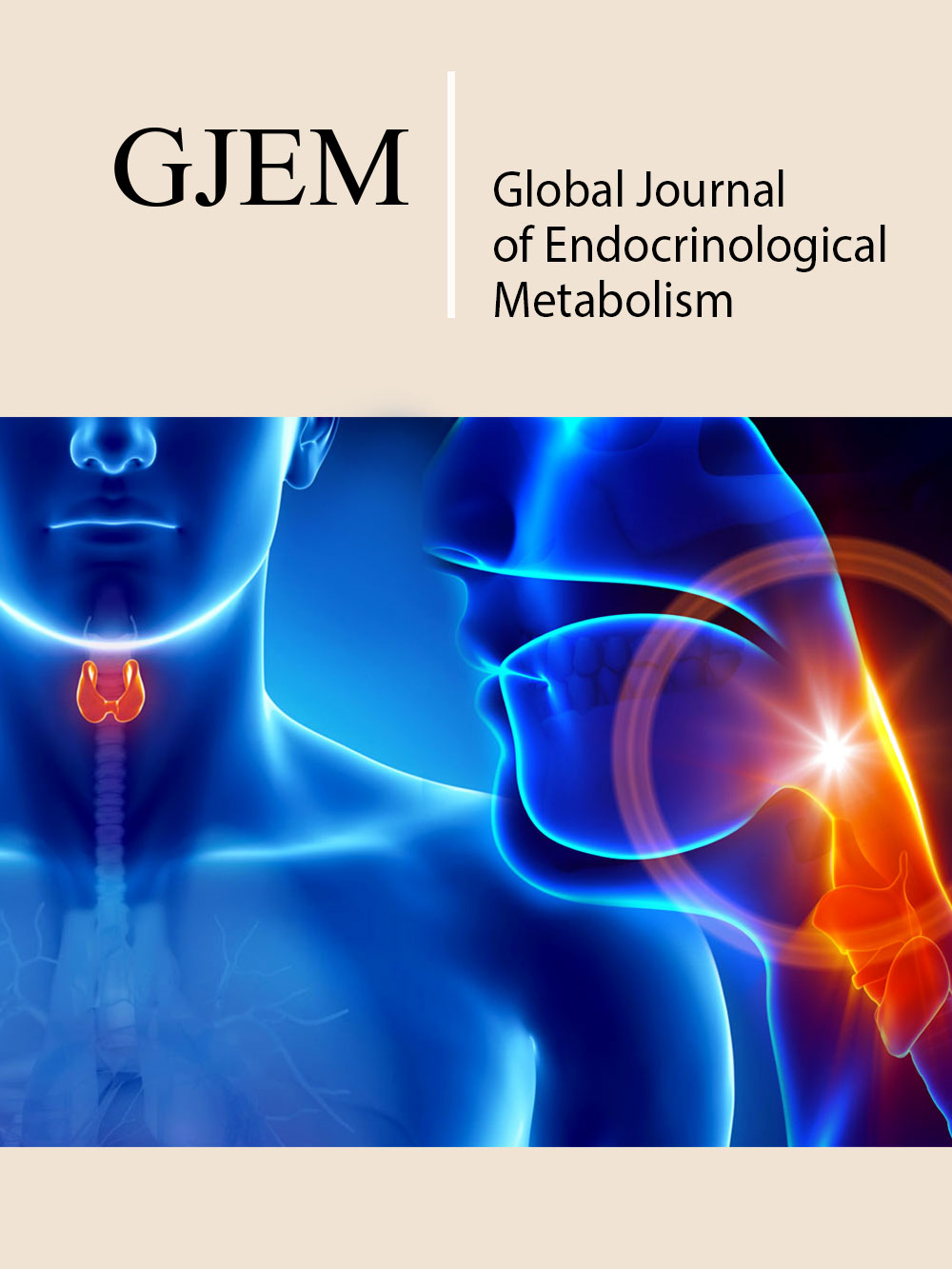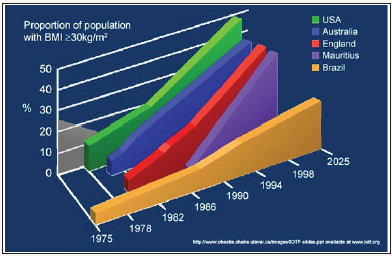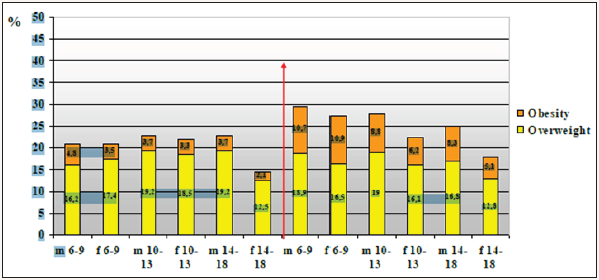- Submissions

Full Text
Global Journal of Endocrinological Metabolism
Our Experience with Two Bulgarian Products in the Management of Metabolic Diseases
Stella Schekerdjiiska1*, Tеodora Handjieva Darlenska2, Nikolay Georgiev1 and Alexander Oscar3
1Natstim, Sofia, Bulgaria
2Department of Pharmacology and Toxicology, Medical University, Bulgaria
3Department of Ophthalmology, Medical University, Bulgaria
*Corresponding author: Stella Schekerdjiiska, Natstim, Sofia, Bulgaria
Submission: March 28, 2018;Published: April 19, 2018

ISSN: 2637-8019Volume2 Issue1
Introduction
Obesity is a chronic metabolic diseases which leads to many comorbidities and high prevalence of mortality [1,2]. The incidence of obesity and related diseases increases constantly (Figure 1-3) [3]. Recently, very much is stressed on the meaning of food supplements in the management of metabolic diseases [4-6].
Figure 1: Expected increase in the incidence of obesity.

Figure 2: Overweight and obesity prevalence in schoolchildren (National survey on nutrition and nutritional status of schoolchildren in Bulgaria -1998, 2010-2011) [2].

Figure 3: Prevalence of Overweight and Obesity among adults (19-60 years old) National Monitoring of Dietary Intake and Nutritional Status, 1998, 2004 [2].

Aim
The aim of this study is to present our experience in the management of the metabolic parameters in the obesity with two our products.
Materials and Methods
Alginates
Clinical study: A total of 120 obese patients (105 given alginates and 15 placebo control group) with mean age 37, 8 years, BMI-33, 7 were followed up for the period of 45 days. Anthropometric indexes were measured as follows: body weight (kg), BMI (kg/m2), waist to hip ratio, fat mass, cholesterol and triglycerides.
Experimental study: 18 male rats Wistar with mean age 4 year were randomized in 2 groups-control group and experimental group receiving alginates. After 3 weeks the body weight, cholesterol, triglycerides, blood sugar and ghrelin were measured.
Glucomanan
Glucomannan is a water-soluble polysaccharide, extracted from the root of Amorphophallus konijac. It is considered a dietary fibre. Glucomannan is a food additive used as an emulsifier and thickener. Dissolved in water, glucomannan gels, absorbing up to 150 times more water than its own weight [7]. A total of 22 subjects (19 women and 3 men) have participated in the study. The following parameters were studied: mean age was 46.8 years, mean body mass index (BMI)-33.9kg/m2, mean fat mass (FM)-42.09%, and mean visceral fat mass (VFM)-11.4. All subjects received 3gr of the food supplement with Glucomanan, dissolved in 200ml water before each meal, and 200ml water after the meal three times/ daily for a 60-day period. At different time intervals the enrolled subjects underwent anthropometric and bio-impedance measurements with Tanita 420. They didn’t receive any other dietary and physical activity advices.
Results
Alginates
Clinical study: A total of 120 obese patients (105 given alginates and 15 placebo control group) with mean age 37, 8 years, BMI-33, 7 were followed up for the period of 45 days. Anthropometric indexes were measured as follows: body weight (kg), BMI (kg/m2), waist to hip ratio, fat mass, cholesterol and triglycerides.
Glucomanan
The food supplement was very well tolerated except in four patients who suffered from flatulence, and mild diarrhea. At the end of the 60-day period a reduction of all studied parameters were demonstrated as follows: mean BMI with 7.3% (p<0, 01), mean FM with 4.9% (p<0, 01), and mean VFM with 5.3% (p<0, 05).
Discussion
The effect of alginates containing food supplement is based on the property of the compounds of alginic acid (organic acid originating from kelp) to produce gel in an acid medium (the gastric juice) which is insoluble and hard to be assimilated in to the organism [8-11].
According to the European food safety authority
Galactomannan contributes to the maintenance of normal blood cholesterol levels in blood. Glucomannan in the context of an energy restricted diet contributes to weight loss [12,13].
Conclusion
i. Our studies suggest that alginates exert beneficial effects on the metabolic parameters in both animal and human obesity.
ii. The use of a food supplement with Glucomanan has a beneficial effect on the metabolic health in obese adults.
References
- Yumuk V, Tsigos C, Fried M, Schindler K, Busetto L, et al. (2015) European guidelines for obesity management in adults. Obes Facts 8(6): 402-424.
- World Health Organization. Global Health Observatory data repository. Obesity.
- Borys JM, Du Plessis HR, Beysens J, Mayer J, Richard P (2015) EPODE for the promotion of health equity. Lavoisier, pp. 11-195.
- Astrup A, Kristensen M, Gnessi L, Watanabe M, Svacina S, et al. (2014) Oral administration of Gelesis 100, a novel hydrogel, significantly decreases body weight in overweight and obese subjects. Endocrine Society’s 96 Annual Meeting and Expo, Chicago, USA.
- Birketvedt GS, Shimshi M, Erling T, Florholmen J (2005) Experiences with three different fiber supplements in weight reduction. Med sci Monit 11(1): P15-P18.
- Schekerdjiiska S (2018) The effect of Glucomanan in the metabolic health in obese adults. 25 European Congress on obesity.
- Schekerdjiiska S, Georgiev N. 16th National Symposium Academic Tosho Toshev Nutrition and Health.
- Handjiev S, Ikonomova K, Chekerdjiiski R, Nachev Ch (2002) The new Bulgarian supplement algigracil-instant in the treatment of obesity. Transport Medicine 24: 23-24.
- Handjiev S, Chekerdjiiski R, Nachev Ch (2003) The role of alginates in the treatment of obesity. First Balkan congress on obesity, Athens.
- Handjieva Darlenska T, Boyadjieva N (2014) The effects of alginates on the apetite and weight in obese rats. Obesity facts 7(Supp 1): 72.
- Handjieva Darlenska T, Doichinova I, Denev I (2013) Pharmacological and clinical study concerning the role of glucomannan in the treatment of the obesity. GP news.
- Dimitrova D (2012) Overweight and obesity prevalence in Bulgaria. Global obesity Forum, New York, USA.
- Handjeva Darlenska T (2018) The alginates in the treatment of obesity. 25 European Congress on obesity.
© 2018 Stella Schekerdjiiska. This is an open access article distributed under the terms of the Creative Commons Attribution License , which permits unrestricted use, distribution, and build upon your work non-commercially.
 a Creative Commons Attribution 4.0 International License. Based on a work at www.crimsonpublishers.com.
Best viewed in
a Creative Commons Attribution 4.0 International License. Based on a work at www.crimsonpublishers.com.
Best viewed in 







.jpg)






























 Editorial Board Registrations
Editorial Board Registrations Submit your Article
Submit your Article Refer a Friend
Refer a Friend Advertise With Us
Advertise With Us
.jpg)






.jpg)













.bmp)
.jpg)
.png)
.jpg)














.png)

.png)



.png)






